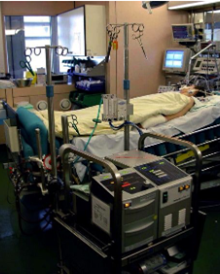Hi, it’s Patrik Hutzel from INTENSIVECAREHOTLINE.COM where we instantly improve the lives for Families of critically ill Patients in Intensive Care, so that you can make informed decisions, have PEACE OF MIND, real power, real control and so that you can influence decision making fast, even if you’re not a doctor or a nurse in Intensive Care!
This is another episode of “YOUR QUESTIONS ANSWERED“ and in last week’s episode I answered another question from our readers and the question was
10 Questions to Ask if Your Loved One is in an Induced Coma in Intensive Care! Live Stream!
You can check out last week’s question by clicking on the link here.
In this week’s episode of “YOUR QUESTIONS ANSWERED” I want to answer questions from one of my clients Marsha, as part of my 1:1 consulting and advocacy. Alexa’s mom is with a tracheostomy and on a ventilator. Alexa is asking how to be the best advocate for her critically ill mom in the ICU.
How Can I Become the Best Advocate for My Critically Ill Mom in the ICU?

Patrik: Hi Alexa! How are you? Patrik here of Intensive Care Hotline.
Alexa: Hi Patrik! Let me tell you my mom’s story. My mother, she was admitted in the intensive care as of December 24th. So, we’re about on the 30th day. Sorry, 30 days yeah. And basically, she’s on a mechanical ventilator. They’ve given her sedative as well.
Patrik: Right.
Alexa: And it’s been since Tuesday of last week that they stopped the sedatives, and she as a result of that had shortness of breath, so we took her to the hospital and then from that point forward, it just became worse and worst.
Patrik: Why did she go into ICU in the first place? Is it COVID?
Alexa: Pneumonia.
Patrik: Pneumonia. COVID pneumonia?
Alexa: No, they ruled out COVID. They’ve done COVID tests, it wasn’t a result of COVID.
Patrik: Okay.
Alexa: So, this is it. And yesterday, we had less of the doctors because they wanted essentially, they wanted to know what we wanted to do and then we told them that obviously, again, we don’t want to see her suffer. This is after I watched the videos and I understood what this means. And so, we had given them yesterday the DNR, the do-not-resuscitate order. And then yesterday, last night, I went back, and I called, and I reversed that, and I told them that we’re not ready to make this decision yet, that’s for not resuscitating in the event of heart failure. So, I’m just at a point right now that, given everything that’s going on, I don’t know how to move forward. Therefore, I reached out to you.
RECOMMENDED:
Patrik: Sure. How old is your mom?
Alexa: She’s 74.
Patrik: Previously fit and healthy?
Alexa: Not particularly. She had kidney disease, she had diabetes, high blood pressure, thyroid issues. Some liver issues because she was a heavy drinker as well.
Patrik: What do you think that she would want if she could make the decision herself?
Alexa: I think that she would want to be left in peace at this point, because she was battling her sickness towards the end of her life and it was starting to become very, very heavy for her.
Patrik: Right. Does she have an advance care plan? Do you know what I mean by that?
Alexa: No.
Patrik: Does she have like a living will where it says what she would want in a situation like this, if it was up to her?
Alexa: Nothing.
Patrik: Nothing?
Alexa: Yeah, so nothing of that sort, no.
Patrik: Have you or any other family members ever discussed a situation like this?
Alexa: No.
Patrik: No, that’s okay. So, you feel that she would be okay with the DNR?
Alexa: I think in the event that she would come out of this somehow and that she would be confined, or her life would be different, and that she would be dependent on others for small things, whether it’s getting out of bed, whether it’s eating, whether it’s having a shower, then in that sense, she would not be happy.
Patrik: Right. You see Alexa, it’s difficult to predict what life after intensive care looks like. It’s very difficult to predict.
Recommended:
Alexa: Yeah.
Patrik: It’s also the reality is that if you want your mom to live, irrespective of what that looks like, that there will be some suffering involved when people go through intensive care. So, it is very difficult in regard to making decisions. Very difficult. Because no one has a crystal ball. I have seen people improve from situations like that and I had people seen not improve from situations like that. It’s very difficult to make accurate predictions. So, she’s been on a ventilator since December?
Alexa: So, since December 24th, and she’s still on the ventilator today. On Friday, they had scheduled a tracheostomy surgery for this week.
Patrik: Right.
Alexa: Yeah. Which was supposed to take place today, actually. And then yesterday when we met with the doctors and they expressed their concern as a result of her not waking up from stopping the sedatives, they asked us at this point what we wanted to do, whether they should continue with the tracheostomy or postpone it. And I just said because things aren’t getting better at the moment, there’s no point, so maybe we should just postpone it until we know a little bit more.
Patrik: Fair enough. I would say if she had a tracheostomy, I’ll tell you what the advantages, I believe, are of her having a tracheostomy. The need for sedation would drastically minimize. And then, she would be in a position hopefully, to wake up and make her own decision.
Alexa: Okay.
Patrik: So that, I see, as one of the main advantages of a tracheostomy. Now, if she doesn’t have a tracheostomy, they might take the breathing tube out and she might pass away. Why is she still on sedation, and why can’t she be taken off the ventilator, do you know?
Recommended:
Alexa: So, they diagnosed her with ARDS or Acute Respiratory Distress Syndrome.
Patrik: Right.
Alexa: So, whenever she’s breathing… so that’s the other thing I wanted to say. Just over the weekend, she was able to breathe on her own, though I think she still has some sort of infection in her lungs and for that reason, they’re not removing the ventilator.
Patrik: They are not?
Alexa: Yeah. They are not. From what I understood.
Patrik: Well, they can’t remove the ventilator without your consent.
Alexa: Okay.
Patrik: Is palliative care involved?
Alexa: They had mentioned it, but again, that’s something that we have not yet made a decision on.
Patrik: Right. Are you feeling pushed to agree to stopping treatment?
Alexa: Yes, to a certain extent, but again, four days have lapsed since they stopped the drugs and she’s not waking, so they’re making that case. And they’re also making the case that now… this is the other thing about her kidneys. They’ve mentioned that’s there’s obviously renal failure and she’s not passing any fluids. She’s not excreting any fluids.
Patrik: Right.
Alexa: And so, it’s the dialysis completely that’s doing the work at the moment.
Patrik: Right.
Alexa: So, there is also said that there’s multiple organ failure that might start occurring. So again, they’re asking us whether we want to continue with the support.
Patrik: Right. And who else is involved in the decision making? Are there family members, or are you the only decision maker?
Alexa: I have other family members involved as well. The thing is that again, watching your video and just listening to how you go about dealing or just addressing situations as a result of your experience, this is it. We just want to throw some objectivity into it and look at things from a different angle as opposed to just allowing the doctors to take center stage on deciding or pushing us in certain direction. So, we want to know what we are consenting to before, make a fully informed decision.
Recommended:
Patrik: Is there any indication that your mom had a stroke … with the tracheostomy, why did they not proceed?
Alexa: Again, it was scheduled for today, and given the concern that she’s not waking up, they didn’t see the point in performing the tracheostomy if we were to then decide to stop the support.
Patrik: Yep, I agree, I agree with that. I agree with that, that there is no point doing a tracheostomy if you want to stop the support. I agree with that.
Alexa: Yes.
Patrik: As I said, one of the main advantages of a tracheostomy is that they can stop minimize sedation. She can wake up and you can explain to her what’s happening, and then hopefully she can direct you in what she wants. Now, the other thing, if she’s got ARDS (Acute Respiratory Distress Syndrome), A-R-D-S, do you know how much oxygen she’s on?
Alexa: No, specifically that I don’t know.
Patrik: Right. The reason I’m asking is, if someone has ARDS, they’re often heavily oxygen dependent. And then a tracheostomy can be postponed if oxygen levels are above 60%, but that doesn’t seem to be the case?
Alexa: I wouldn’t be able to confirm that.
Patrik: Right.
Alexa: Because I haven’t… yeah.
Patrik: Look, the devil is in the detail, Alexa.
Alexa: Yes.
Patrik: I would like to know a bit more in terms of what ventilator settings is she on, what medications is she on, what have they done for the ARDS, what has worked, what hasn’t worked. You’re giving me very valuable information, but I don’t know have enough details to say to you, “Yep.” With the limited information that you’re giving me, I would say yes, if you want to stop treatment, stop treatment, don’t do a tracheostomy. But can you live with that? Can you make a decision for your mom without giving her the chance to wake up? And she will have a much higher chance of waking up if she has a tracheostomy.
Suggested links:
Alexa: Yeah. Because now, she’s sort of already sedated. She’s lucid in the sense that she doesn’t know what’s going on and then she’ll pass. If we wake her, I don’t know then. How is it that they then, at that point, if she consciously decides that she no longer wants to be here, then at that point, do they perform some sort of euthanasia to put her to sleep again?
Patrik: Oh, that’s a great question, Alexa. That’s a great question. And that would certainly be one of my concerns, that it could head in that direction. It absolutely could head in that direction. And then euthanasia, as you know, it’s illegal even though it happens in ICU every day, all over the world. The question definitely needs to be asked, and that it could very well head in that direction.
Alexa: Okay, so Patrik, how would you be able to help me to point me in terms of the decision that is based on the data that I’m collecting, if I can get some information? Because I just feel right now, I don’t know enough to make a decision.
Patrik: Yeah, I agree.
Alexa: All I do know is that yes, she was very old, she was very sick. She’s been in the ICU for this amount of time. Things aren’t looking good, and with all that, I would just lean towards allowing her to pass on.
Patrik: Yeah.
Alexa: Letting her go.
Patrik: Look, how would I help you? So, as I said, I would want to know a lot more details. ventilator settings, blood results, chest x-ray results. I would ideally want to talk to a doctor or a nurse, or at the bare minimum, look at some of the medical records, and then I would be able to point you in the right direction. My concern is this. So, let’s just say you go, and you say, “Hey, I really think it’s best for my mom to let her pass away.” You’ve got to almost protect yourself 12 months out. In 12 months’ time, you might be thinking, “Oh, what if?” And it’s almost like you’ve got to protect yourself 12 months out, because you don’t want to be asking. Now is the time to ask what if, not in 12 months’ time.
Alexa: I understand.
Recommended:
Patrik: Right. And the only way I can help you with the what-ifs is to either talk to one of the doctors or one of the nurses or look at medical records so that I have a better understanding. And I do believe if you and I were to talk to a doctor or a nurse, you will see that I will be asking questions that you probably haven’t even considered asking, but that are highly relevant.
Alexa: Okay. But because of time, time is of essence at this point. Today, I was supposed to be meeting with the doctors as well. It almost as if they’re waiting for us right now to make that decision as to whether..
Patrik: Possibly.
Alexa: … we continue with the therapies, and we allow the tracheostomy to go through. And a lot of this, this whole decision is pretty much weighing on me. So, I don’t know how much time we have for you to look at the medical records or whatnot. I think the best would be maybe you could have a conversation and then you will be able to get an understanding of some level of what is happening, and for yourself to be able to maybe dig in a little bit more. And then maybe at that point, that would be as far as we can go, given the time constraints.
Patrik: I agree with you, that talking to someone would be the quickest way.
Alexa: Okay. So would you have time left, because I know you’re on the other side of the world. I’m thinking maybe New Zealand or Australia?
Patrik: In Australia.
Alexa: All right, okay.
Patrik: Yeah, I know. Look, I mean, I’m talking to people in different places every day, so I’m well aware of time zones. I am not sure whether I can do it today, I’m not sure about that. How quick do you think you can get a doctor on the phone?
Alexa: I can have a doctor on the phone available today. What time today, I don’t know. I’d have to call the hospital and find out who would be available and then I would be able to schedule a call.
Patrik: Right.
Alexa: Maybe in an hour or two hours, something like that.
Suggested links:
Patrik: Right. In terms of timelines, you are saying you’re not sure how much time your mom has left. Do you know if she’s on inotropes or vasopressors? Do you know what I mean by that?
Alexa: No, I don’t.
Patrik: That’s okay. Do you know if she’s on medications for her blood pressure?
Alexa: If she was previously on medication for her blood pressure or currently?
Patrik: Currently, currently.
Alexa: Currently in the hospital, I would not be able to tell you. But they told me because of the dialysis, that that has an effect on the blood pressure, so I’m assuming they’re doing something for that.
Patrik: Right. Yeah, that makes sense. Well, I’ll tell you something. I would argue that if they’re still doing dialysis, her blood pressure is holding. There’s no way they could do dialysis if her blood pressure was low. Because otherwise, they couldn’t be getting blood out of her. Are you able to visit your mom?
Alexa: Yes, I am.
Patrik: Right. Is she responding to you?
Alexa: No.
Patrik: Right, okay.
Patrik: No, not at all. Look, she may not respond to you because she’s sedated.
Alexa: Yeah.
Recommended:
Patrik: Right? So, it’s probably got nothing to do with you. It’s just the sedation.
Alexa: Okay. So Patrik, maybe you can let me know when you would have that time, and then as far as a call, they can go for that, and all I would need is for you to maybe go in, get an understanding at your level of what’s happening, and then maybe just give me a better idea of… somebody in my position, what direction I should take.
Patrik: Yes, I agree. Look, Alexa, let’s do this. I will send you an email in a minute.
Alexa: Okay.
Patrik: Oh well, we sent it to you before. Did you see an email with the consulting and advocacy options? Did you see that?
Alexa: Yes, I saw them.
Patrik: Yeah, you can just go back to that and select from what you think is best. I do believe an hour might actually be enough. I do believe that.
Alexa: Okay.
Patrik: And then we can go from there. I’m just trying to think in terms of timing. How do you get updates from the doctors? How does that happen?
Alexa: They just give us a call.
Patrik: They just give you a call randomly?
Alexa: Yeah, there’s no scheduled calls or anything. They just call us when there’s anything that they need to talk to us, that’s happening, there’s some sort of event that’s happened.
Patrik: Right. What about when you go there, do you get updates then?
Alexa: It depends on whether the doctors are there or not.
Patrik: Right.
Alexa: So, most times if the doctors are not on the floor, then we call them to try to get a hold of them to see what’s going on.
Patrik: Right. Look, can I get back to you… or let me ask you this. Do you think you can set up a phone call with the doctors, let’s just say if you could set up a call with them around 6:00 PM tomorrow, I can be available then? If not..
Alexa: Okay.
Patrik: … it’ll probably be… the next time I would be available. I can be available between 6:00 PM and midnight your time, but you might not get a doctor on the phone around this time.
Alexa: No, is that the night between 6:00 PM and midnight your time there, or you’re saying 6:00 PM and midnight my time?
Patrik: Your time. 6:00 PM to midnight your time.
Alexa: Yeah, that’s fine, because the doctors, there’s actually a lot of doctors. I think there’s like four or five doctors that are in the ICU, so I’m always talking to a different doctor, and then this is another part of this merry-go-round of information, so that even adds this complexity to everything, because each and every doctor, because yesterday I called in and the doctor that I spoke with, and then whereas last week when I spoke to a doctor, he said, “Well, you know, this is what’s happening, let’s give your mother a chance and let’s get an update at the end of this week.”
Suggested links:
Patrik: Right.
Alexa: So that was another doctor that had mentioned that to me last week when I was there, and so that was the game plan. And then yesterday, some other doctor called me, and everything changed.
Patrik: Right.
Alexa: Patrik, if you can make yourself available this evening between 6:00 PM and 12:00, between 6:00 and 12:00 PM.
Patrik: Yeah.
Alexa: … then I can go ahead and find a doctor that I can schedule that call with.
Patrik: I think that’s the best way to deal with it.
Alexa: Okay.
Patrik: And go from there.
Alexa: Okay. Perfect. Yeah, I just wanted to say I think that what you’re doing, this line of work, however you’ve come into it, it is very, very special. This is the first time of anything that I’ve encountered and anybody that offers this kind of support and during such a critical time.
Patrik: Right.
Alexa: And I think it’s very special, so I commend you for that.
Patrik: Well, I appreciate that. Look, I’ll give you the short version, how I ended up doing this. I worked in ICU for over 20 years as nurse, and I saw the need for it, that’s all.
Alexa: I was talking with my brothers yesterday and I’m like, “It’s almost as if we’ve gone into some new world and we’re speaking a different language, and now we have to make a life-altering decision as a result of that.”
Patrik: And it’s not fair.
Patrik: No.
Alexa: Okay.
Patrik: Look, let’s do that.
Alexa: How do you want me to communicate this? Do you want me to just email you once I’ve confirmed the time?
RECOMMENDED:
Patrik: Yes.
Alexa: I’ll go ahead, and I’ll make that purchase for one hour. I’m at my office, I’ll make that. And then from that point forward, I can email you.
Patrik: Please.
Alexa: … and I can say the doctor will be..
Patrik: Please.
Alexa: Yeah? Okay.
Patrik: Okay.
Alexa: Okay, then.
Patrik: Thank you so much.
Alexa: Okay, Patrik, thank you very much.
Patrik: We’ll talk then. Thank you so much, Alexa. Take care.
Alexa: Okay.
Patrik: Thank you. Bye.
Alexa: Okay, Patrik. Thank you, bye-bye.
Patrik: Bye.
The 1:1 consulting session will continue in next week’s episode.
How can you become the best advocate for your critically ill loved one, make informed decisions, get peace of mind, control, power and influence quickly, whilst your loved one is critically ill in Intensive Care?
You get to that all important feeling of making informed decisions, get PEACE OF MIND, CONTROL, POWER AND INFLUENCE when you download your FREE “INSTANT IMPACT” report NOW by entering your email below!
In Your FREE “INSTANT IMPACT” report you’ll learn quickly how to make informed decisions, get PEACE OF MIND, real power and real control and how you can influence decision making fast, whilst your loved one is critically ill in Intensive Care! Your FREE “INSTANT IMPACT” Report gives you in-depth insight that you must know whilst your loved one is critically ill or is even dying in Intensive Care!
Sign up and download your FREE “INSTANT IMPACT” REPORT now by entering your email below! In your FREE “INSTANT IMPACT” REPORT you’ll learn how to speak the “secret” Intensive Care language so that the doctors and the nurses know straight away that you are an insider and that you know and understand what’s really happening in Intensive Care! In your FREE report you’ll also discover
- How to ask the doctors and the nurses the right questions
- Discover the many competing interests in Intensive Care and how your critically ill loved one’s treatment may depend on those competing interests
- How to Eliminate fear, frustration, stress, struggle and vulnerability even if your loved one is dying
- 5 mind blowing tips & strategies helping you to get on the right path to making informed decisions, get PEACE OF MIND, control, power and influence in your situation
- You’ll get real world examples that you can easily adapt to you and your critically ill loved one’s situation
- How to stop being intimidated by the Intensive Care team and how you will be seen as equals
- You’ll get crucial ‘behind the scenes’ insight so that you know and understand what is really happening in Intensive Care
- How you need to manage doctors and nurses in Intensive Care (it’s not what you think)
Thank you for tuning into this week’s YOUR QUESTIONS ANSWERED episode and I’ll see you again in another update next week!
Make sure you also check out our “blog” section for more tips and strategies or send me an email to [email protected] with your questions!
Also, have a look at our membership site INTENSIVECARESUPPORT.ORG for families of critically ill Patients in Intensive Care here.
Or you can call us! Find phone numbers on our contact tab.
If you want a medical record review, please click on the link here.
Also check out our Ebook section where you get more Ebooks, Videos and Audio recordings and where you can also get 1:1 counselling/consulting with me via Skype, over the phone or via email by clicking on the products tab!
This is Patrik Hutzel from INTENSIVECAREHOTLINE.COM and I’ll see you again next week with another update!







